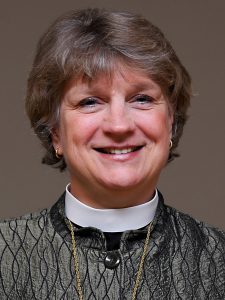
By Bishop Ann Svennungsen
Each of the three congregations I have served included an aspect of social justice or social ministry in my job description. Zion Lutheran in Iowa City, Iowa, had a peace and justice group; Edina Community Lutheran has an expectation of regularly mentioned social issues in the sermons; and at Trinity in Moorhead we created an evangelism and social justice pastoral position.
As a pastor I have often asked myself how we can live out Micah’s call to “do justice.” How can we fulfill the promise we make in the affirmation of baptism “to strive for justice and peace in all the earth?” I believe both our congregations and individual disciples want to be faithful in this calling, but we often wonder how we make a concrete difference for the sake of justice.
This week, 44 people are attending faith-based community organizing training sponsored by our synod. I attended the same training a year ago and experienced an incredible “aha” moment. For the first time, I felt like I’d experienced a specific faith practice for “doing justice.”
Justice will not come to the neighbor in need simply because we’ve got a brilliant argument for a change that makes for justice.
THROUGHOUT HISTORY, Christianity has offered specific guidance on the practice of prayer (Ignatian spiritual exercises), the practice of Bible study (the ELCA’s Book of Faith), the practice of hospitality (The Order of St. Benedict). What if we could sense the same concrete wisdom for guiding us in the practice of “doing justice?” I believe faith-based organizing is just such a thing.
Key things are “deep listening” to the needs of the community through focused “one-on-one” conversations; discernment about a particular issue the community wants to address; identification and equipping of leaders; building a coalition of allies; assessing who has “the power” to make change; planning and implementing the process needed to convince those in power.
Christian practices are initiatives Christian people do together over time to address fundamental human needs in the light of and in response to God’s grace within all creation through Christ Jesus. Our EcoFaith Network has used this practice around the issue of inclusive financing — making alternative energy solutions affordable for everyone. And, our synod is using community organizing in its efforts on racial and economic justice.
Christian practices are initiatives Christian people do together over time to address fundamental human needs in the light of and in response to God’s grace within all creation through Christ Jesus.
Oh, some may be cautious about the use of community organizing — hearing in the media about confrontational practices or attention-seeking actions. The methodology we use at the synod is more sensitive to the culture of the church — and to its values.
Sometimes, we think our calling is simply to have a good idea; make a strong case. Organizing asks us a deeper question: How can you actually succeed in making a difference? Justice will not come to the neighbor in need simply because we’ve got a brilliant argument for a change that makes for justice. We also need strategies whereby, together, we act to convince those with power to make that change.
